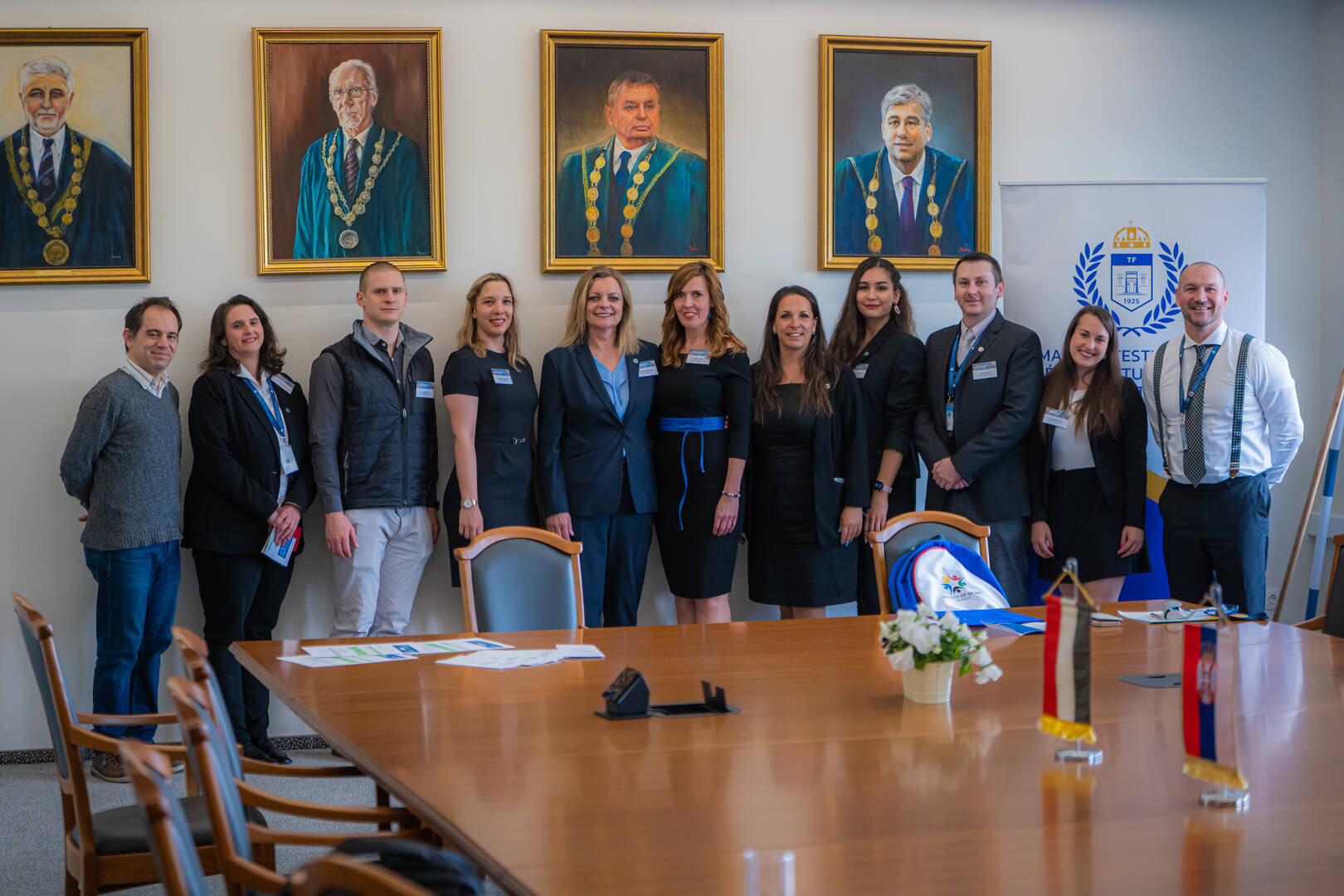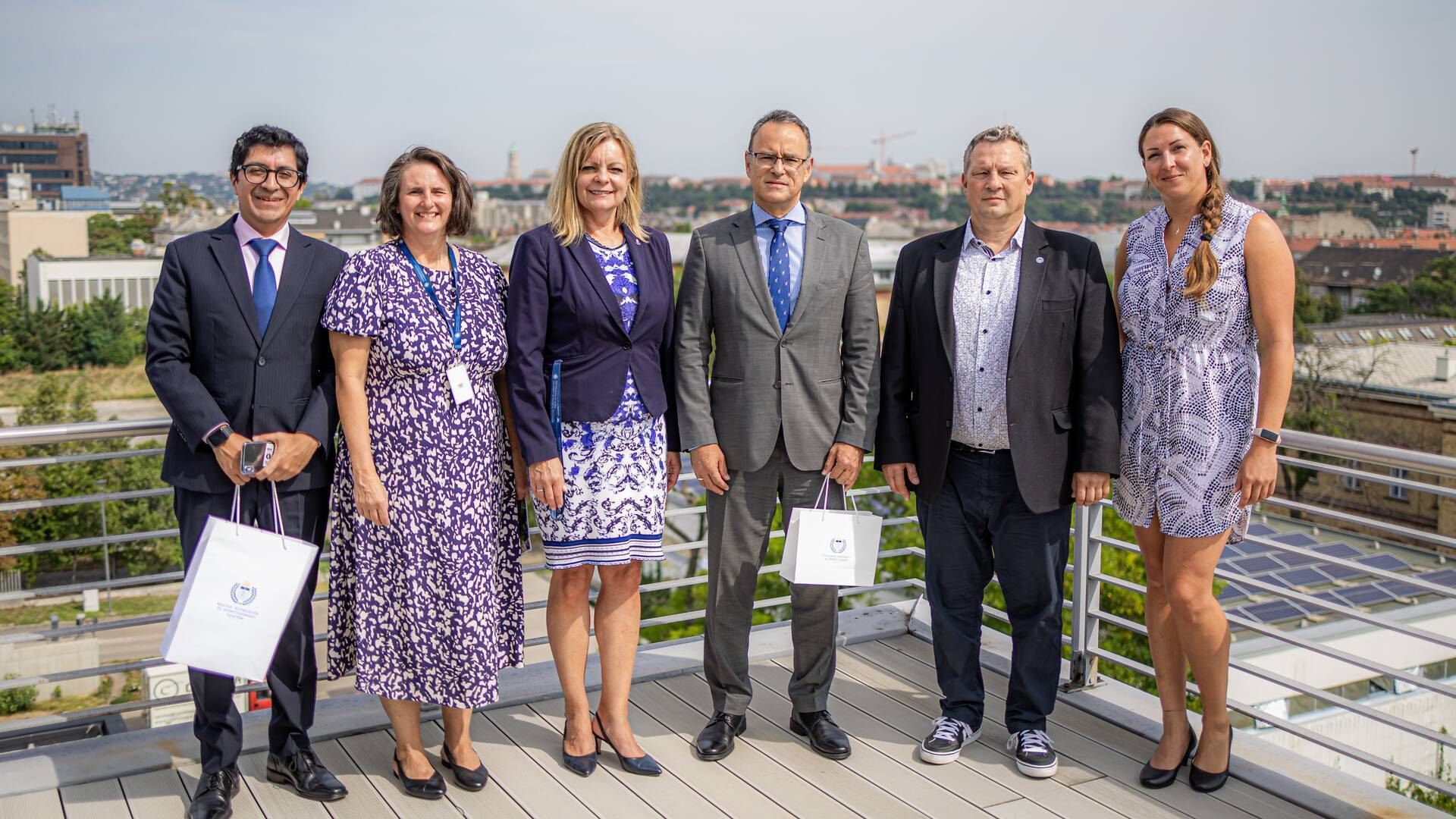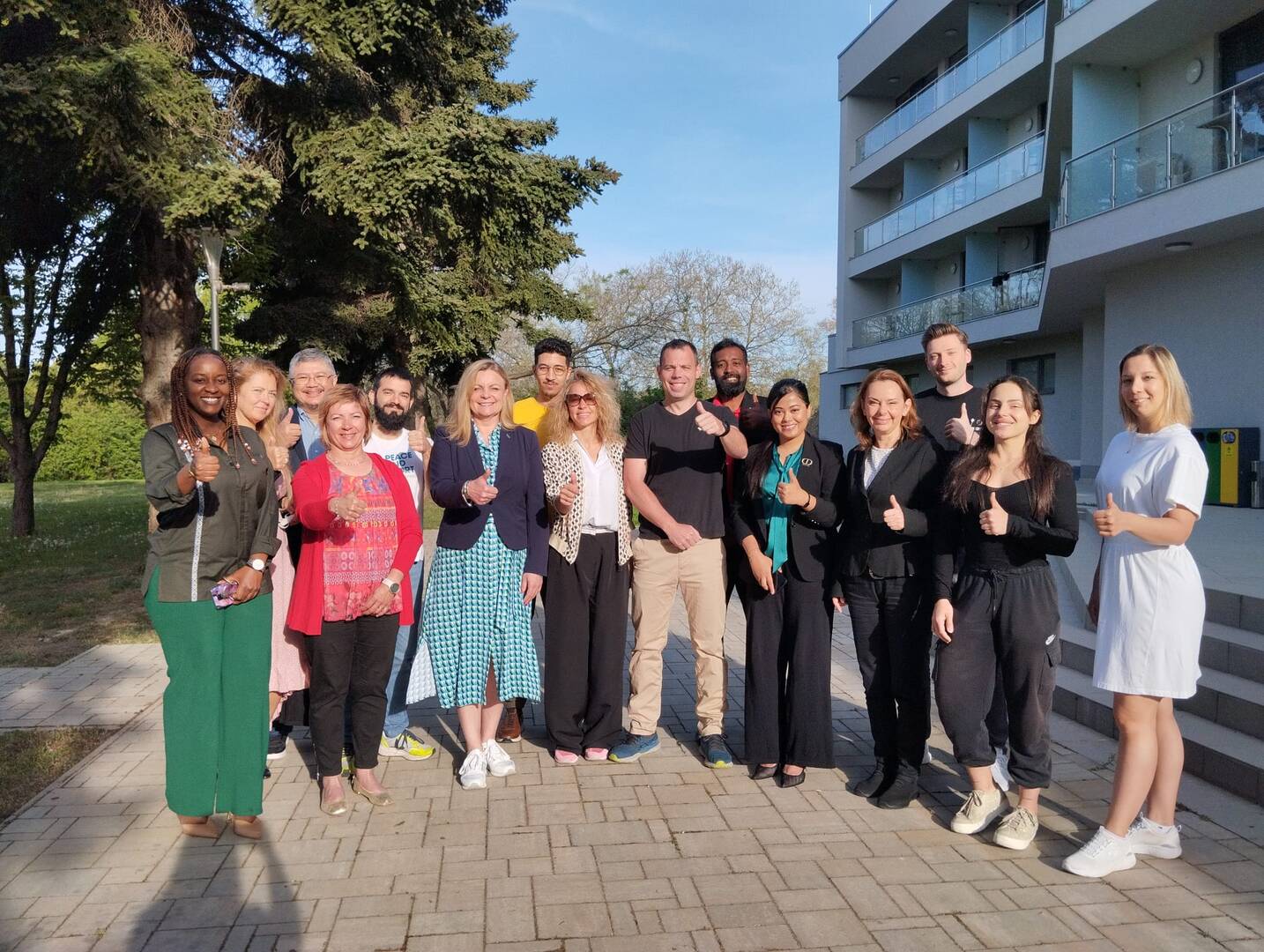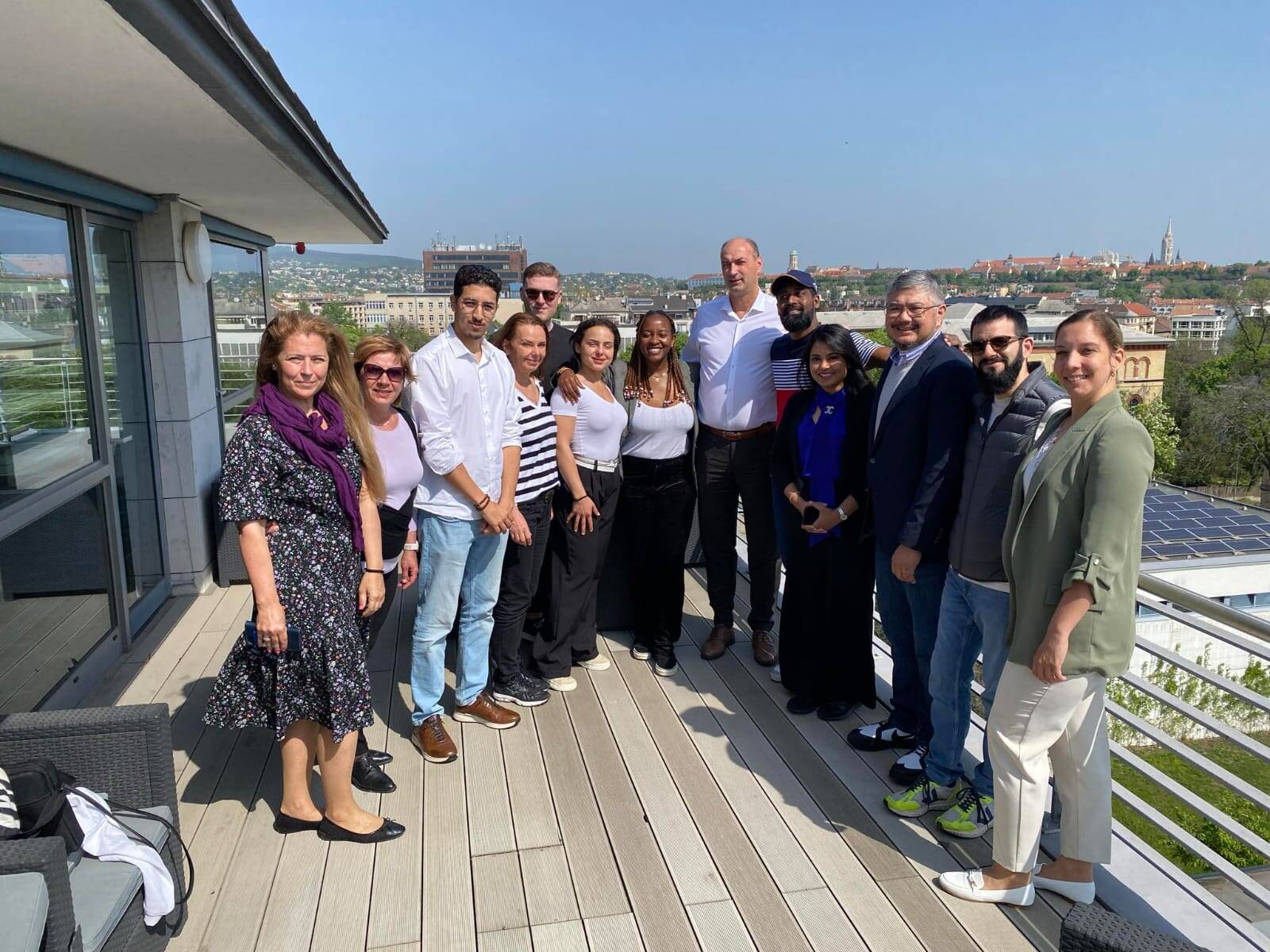HUSS delegation pays fruitful visit to Zagreb sports diplomacy forum >>>
Peruvian Ambassador to Hungary pays introductory visit to the Hungarian University of Sports Science >>>
HUSS participates in Sport Diplomacy Conference >>>
Well-known Olympic and World Champion Ethiopian runners pay visit to HUSS >>>
Web: https://tf.hu/sdp

Admission prerequisites
Prerequisites for Admission: Prospective candidates should hold a BA or BSc diploma in a relevant field within Sport Science or Humanities. Priority will be given to those with qualifications in disciplines such as International Relations, Sports Science, Business Administration and/or Economics, Communication, and Marketing. A minimum of 80 ECTS credits or their equivalent is required. A copy of the degree should be included as part of the application package.
Lack of criminal record is one of the entrance criteria that has to be proved by an official document issued by the official national authority, not older than 3 months.
Language Proficiency Criteria: Applicants must possess a minimum of B2 level proficiency in English or its equivalent. A robust and actively utilized command of the English language is imperative, while proficiency in additional languages is highly regarded and appreciated.
Competencies to consider for credit
Applicants seeking credit for their professional sport career or diplomatic career should highlight their relevant competencies. Additionally, candidates with an additional Bachelor's or Master's degree in fields related to Sport Science, Humanities, Economics, or other pertinent academic disciplines are encouraged to apply. Submission of a copy of their degree or diploma should be included in the application package. Furthermore, individuals who have pursued further related training, such as Leadership, Business Coaching, Project Management, and Communication, are also eligible for credit consideration. It is important to emphasize these qualifications in the application process to demonstrate a comprehensive and well-rounded background.
Registration deadline: 30 November, 2024. (23:59)
Please register and then submit your application at here.
Start date: February, 2025.
Partners
- Hungarian Ministry of Foreign Affairs, Department of Sports Diplomacy
- ILEPS, Cerny, France
- UNM GEO, Albuquerque, NM, USA
- Foro University, Rome, Italy
- Tesla University, Belgrade, Serbia
- Teqball Hungary
Training venue
Hungarian University of Sports Science (HUSS/ Magyar Testnevelési és Sporttudományi Egyetem) Alkotás út 42-28. H-1123 Budapest
+ internship venues

Program Learning Outcomes
- Attitudes: Ideal candidates for the International Sports Diplomacy Postgraduate Specialisation Programme embody open-mindedness and flexibility, demonstrating a goal-oriented approach combined with an unwavering determination and strong work ethic. They exemplify helpfulness and maintain a positive attitude, while showcasing adept complex and critical thinking skills. Empathy and a deep respect for cultural diversity drive their interactions, and they engage in careful consideration of various perspectives. Candidates eagerly embrace learning, seeking to comprehend intricate correlations and accept institutional priorities. Their readiness to delve into challenging situations, coupled with an innate ability to integrate diverse sources of knowledge, positions them as a prime candidate for this transdisciplinary endeavor.
- Knowledge: Embark on an enriching journey with our distinguished hybrid International Sports Diplomacy Postgraduate Specialisation Programme, thoughtfully crafted to deepen your grasp of the intricate interplay between international relations and sports governance. Through a comprehensive curriculum encompassing the foundational tenets of diplomacy, strategic planning, and diplomatic methodology, you will adeptly navigate the intricate terrain that bridges the sport industry, civil sector, and prevailing global trends. By delving into communication protocols, deciphering the dynamics of international sport organizations and events, and exploring the nuanced realms of legal and marketing aspects intrinsic to Sports Diplomacy, you will gain a holistic perspective. Upon the successful completion of SDP, you will possess a complex understanding of the fundamentals of diplomacy, strategic planning and diplomatic methodology, sports governance, sport industry and the civil sector in the international arena, global, regional and national trends shaping sports and diplomacy, protocol in international relations, responsibility over various forms of communication, understanding international sports organizations, relations and events, law and marketing relevant in SD, correlations between SD and society, as of inclusion and integration through sports for all/grassroots SD, awareness of sport media, and the basics of international sport events. Equipped with this knowledge, you will be well-prepared to actively contribute to international sport events, emerging as a catalyst for positive change in a world where Sports Diplomacy holds increasing significance. Join us in this educational odyssey, where you will emerge as a skilled advocate of Sports Diplomacy, poised to shape a more harmonious global landscape through astute insights and strategic acumen.
- Skills: Completing a International Sports Diplomacy Postgraduate Specialisation Programme equips participants with a diverse skill set, ranging from effective communication and strategic planning to adept negotiation and creative problem-solving. Aspiring participants gain proficiency in decision-making and protocol adherence, enhancing their ability to navigate complex international scenarios. The program fosters expertise in rhetoric and institutional representation, empowering individuals for impactful media appearances and adept networking. Graduates emerge with an exceptional knack for organizing meetings and handling challenging situations, complemented by a refined aptitude for stress management and responsible media content creation.
- Autonomy and responsibility: SDP graduates should fully understand both their responsibility for the institution they represent, and their individual sphere of action that entails large responsibility in various matters. They should be fully aware of the limitations of their position and at the same time be ready to act up to the fullest capacity they have to achieve the preset goals.
- General competencies: Our comprehensive SDP offers a holistic approach to develop essential general competencies. Through engaging modules, you will master the art of negotiations, effective project management, diplomatic protocol, crisis management, assertive communication and written business communication. Additionally, you will broaden your horizons by gaining a more profound understanding of advocacy, accuracy, leadership, team spirit, management, thus you will be able to make sound judgments under uncertain conditions, while demonstrating team spirit and emotional intelligence.

This part-time hybrid program is highly practice oriented, interdisciplinary and diverse as for the array of professional areas covered. The international team of faculty and guest lecturers facilitates a unique blend of study experiences offered on various platforms: the hybrid format is to give the required flexibility for the participants to have more control over their study time periods, since the majority of the academic period is taught online, with synchronous and asynchronous teaching methods. The two-week on campus modules each term are essential to familiarize with specific in person competencies, such as communication and diplomacy practice. Through the extensive academic, diplomatic and sport administrational network of HUSS and its partner universities, students can enjoy great placement choices and multiple prospective study topics for their project that leads up to their final exam. The faculty members are engaged in both theoretical and practical approaches to Sport Diplomacy and all have substantial experiences in their specific area.
Core subjects
- Diplomacy
- International Relations, Diplomatic Theory
- Diplomatic Practice
- A Historical Approach to SD in Central Europe
- Sport in Society, Sport for All
- International Sport Law
- Public Administration and Policy
- Global Sport Policy and Politics
- International Sport Organizations
- Global Sport Relations,
- International Sport Events
- Grassroots Sports Diplomacy
- Communication
- Negotiations
- Public Speaking and Media Presence
- Written Communication
- Protocol, Event Management
- Project Methodology, Fundraising, Marketing
Core Team
- Dr. habil Judit Kadar, Director of International Relations at the Hungarian University of Sports Science (HUSS), Associate professor
- Dr. Marko Begović, Faculty of Sport, University Nikola Tesla, Belgrad, Serbia | Associate Professor at Faculty of Business Administration and Social Science, Molde University College, Norway
- Silvija Mitevska, Senior project manager, Olympic Committee of North Macedonia
The program involves over 40 internationally acclaimed area experts from 3 continents, including founders and practitioners of Sports Diplomacy.

Program structure
In Term 1, the program initiates with a comprehensive orientation during Week 1, focused on program introduction and preparatory guidance. Week 2 is dedicated to individual preparations, resource collection, course material acquisition, study strategy development, and the creation of individual program plans. Consultations for program and project planning are also conducted during this phase.
Weeks 3 to 6 feature a series of online contact classes, each lasting 90 minutes, complemented by 20-minute individual consultation sessions. Weeks 8 and 9 mark the commence of on-campus classes, followed by Weeks 10 and 11, which revert to an online format. Term 1 wraps up in Weeks 12 and 13 with exams.
Term 2 begins with an online review of Term 1 and an introduction to the curriculum for the following weeks. Weeks 2 to 10 consist of online contact classes, while Weeks 11 and 12 incorporate on-site classes, which are also accessible online. Weeks 13 to 15 are dedicated to internships, job shadowing, and project work. The program ends with a final examination or portfolio presentation in Week 16.
Curriculum
Rules and regulations
soon
Internship sites
soon


















































